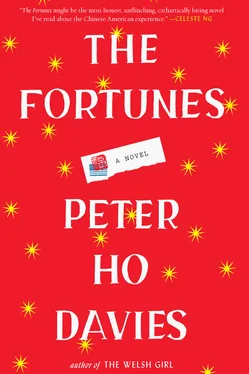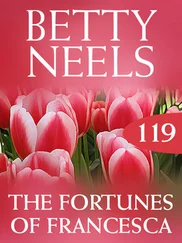“Yessir,” he whispered. “Goodnight, sir.”
Crocker just shook his head again—“Twenty years and forty pounds ago”—and reached for the decanter.
11.
Ling had lain awake that night, tossing and turning, his shoulders bumping the wall beside the narrow cot, the narrowest he’d slept in since his passage from Hong Kong. Then, though, he’d been hemmed in on all sides by other Chinese; now he was alone in a box not much bigger than a coffin. It made him think of the dead president again—“Emperor Lin Con,” as Uncle Ng called him. Ling knew foreign devils didn’t practice ancestor worship, but the body’s journey home had moved him and he’d found himself weeping for the slain man, though at the time of his death he’d been in the country no more than a few months. Now he contemplated his own bones, where they’d lie at last. He paid his dues to his district company, which would see his remains returned home if he died, but he couldn’t imagine it suddenly. Besides, who would worship him, whose ancestor would he be, growing old among all these bachelors? He felt himself a hungry spirit already, rattling in his own jar, gnawing on his own bones. He missed home, he thought, wherever it was.
In the morning he brewed coffee for Crocker, laid out his dressing gown beside his berth. He felt himself sway with tiredness, almost as if the train were already in motion. He caught himself longing for his bed back in the attic of the Crocker home and shook his head to clear it.
Strobridge brought the news just past sunup. The Chinese were back at work. They had listened! Ling thought. He felt jolted with joy, as if the train had lurched forward. But then outside he heard their Irish foremen jeering at them: “Welcome back, boys. Good of ye to join us.”
He pushed past Strobridge, down the steps and away from the carriage, watching the lines of workers draining into the tunnel. One man, slight in dark pants and a filthy shirt that might once have been white, paused crossing the tracks and turned to face the locomotive, buckets of tools dangling pendulously from each hand. For a moment it seemed as if he were barring the way, staring the engine down, as if it couldn’t flatten him beneath its wheels. The man raised a hand as if to wave it away, bucket flailing, but Ling was too far off to hear what he called, and then two of his fellows hustled him away.
Mounted men, their horses stepping daintily among the rocks as if not to wake the rifles cradled in their riders’ arms, ringed the encampment.
Strobridge was smoking on the rear platform when Ling climbed back onboard. The foreman was gazing into the dark socket of the tunnel, and yet Ling had the uncanny sense of the man’s ruined eye, behind the patch, following his movements.
“Tell the boss when he wakes,” Strobridge reminded him, and Ling, startled for a second to think they shared the same boss, nodded once, feeling it as a great burden.
He broke it to Crocker when he delivered his egg.
“I won’t be returning to Sacramento, sir.”
“Why, whatever for?”
“I thought I’d hire on the line.”
Crocker shook his massive head, his beard rasping on the brocade collar of his dressing gown.
“You shouldn’t listen to those harsh words I had for the others, you know. They’re not meant for you. Why, you’re practically one of the family. The children wouldn’t hear of me letting you go.”
Ling thought of the Crocker boys, laying pennies on the rails with them one day when they were seeing their father off, and marveling together after the train had passed at how the coins had been warped under the wheels, the Indian head smeared and obliterated. “But are they still worth anything?” little William had asked querulously.
“Please to convey my sincerest apologies to them, sir.”
Crocker gave him a pinched look.
“You reckon I’ll give you a raise when I wouldn’t give that lot one? It’s hardly a sound bargaining position to threaten to leave for a poorer-paying post, my boy!”
“No, sir. That’s not what I want.”
“You really mean it.” Crocker sighed. “You’d trade this for that?”
“Yes.”
The big man was tapping around his egg with a knife, cracking the shell neatly.
“You think I treat these men harshly, is that it? That I endorse, even authorize, Stro’s methods?”
“Yessir.”
“Well, perhaps I do. Though never with you, you agree?”
“That’s true.”
Crocker pried open the top of the egg, releasing a thin column of steam. “So, just to be clear, you leave me on point of principle.”
Ling nodded.
“What is it you reckon you owe these men exactly?” Crocker took a sip of his coffee, dabbed his lips. “And here I was thinking I was the one who was paying them.” The cup, Ling saw, was from England, the blue willow pattern a ghost’s dream of China.
“What the deuce has gotten in to you?” Crocker set the cup back in its saucer with a clack, slopping a little coffee on the tablecloth, and Ling had to stop himself from reaching forward to blot it. All that sustained him was that the Chinese had already kowtowed to Crocker once that day. “It’s business, you know. Nothing personal.”
Ling stared at the stain on the linen between them as if memorizing it.
“My,” Crocker said at last. “You have pride. I would not have featured it.” He whistled softly. “What a continuous marvel you people are.”
Ling bowed infinitesimally.
“Talk about seeing the elephant! Very well. I’ll tell Strobridge. He won’t give you any special treatment, you know.”
“I understand.”
“Then you’re dismissed.” Crocker shoveled a spoonful of egg into his mouth, spoke around it. Only the pallor of his cheeks betrayed his fury. “Just don’t come crawling back. It would be such a letdown.”
Ling bundled his few possessions in his bedroll. He took a last look at the folded suit and the white shirt hanging on the back of the door. He’d never felt entirely at ease in them, ever conscious of the clean linen, anxious not to soil the clothes, to preserve them as long as possible in their pristine state. He always tried to sit carefully so as not to crease them, to remain as calm as possible so as not to perspire. He’d wanted to avoid any sign on them of contact with the world — a smudge of ash from a pipe or the fire, or, worse, an ink or food stain. But he’d also aspired to leave no mark on them himself. He sniffed the underarms of his shirt each night, studied his cuffs, judging if they might serve another day. And it gave him a particular sense of satisfaction — no, relief, really — to see his collar still pristine now, as if unused, as if he’d somehow moved the whole day within its stiff circumference but never quite touched it.
He had thought he was just uneasy at the notion of someone else washing his clothes. There seemed something shameful in having another Chinese do his laundry (the Crocker linen had eventually gone to one of Ng’s competitors). But now he realized it was because he’d known the clothes were never truly his.
He recalled the new product Crocker’s store had begun to stock: celluloid collars. “Celluloid?” he’d asked. “Oh, it’s the coming thing,” the importunate clerk had assured him. “The future! Don’t need no starch, you see.” Ling had been admiring one when the clerk placed the advertising handbill under his nose, with a line drawing of a caricatured laundryman and his customer.
Chinaman: No tickee, no washee!
White: No washee, no Chinee! So long, John!
Ling shook his head mournfully at the memory, allowed himself to smooth with his forearm, one last time, the velvety crown of his derby before setting it atop the pile.
Читать дальше












